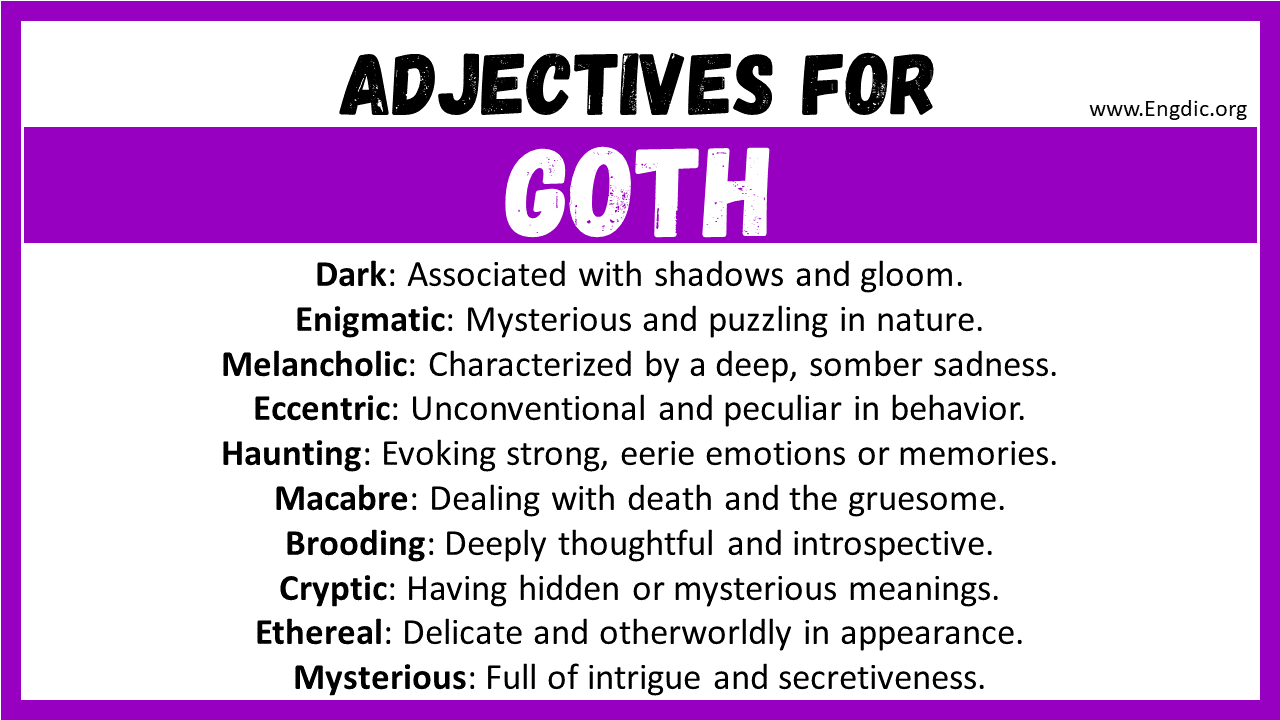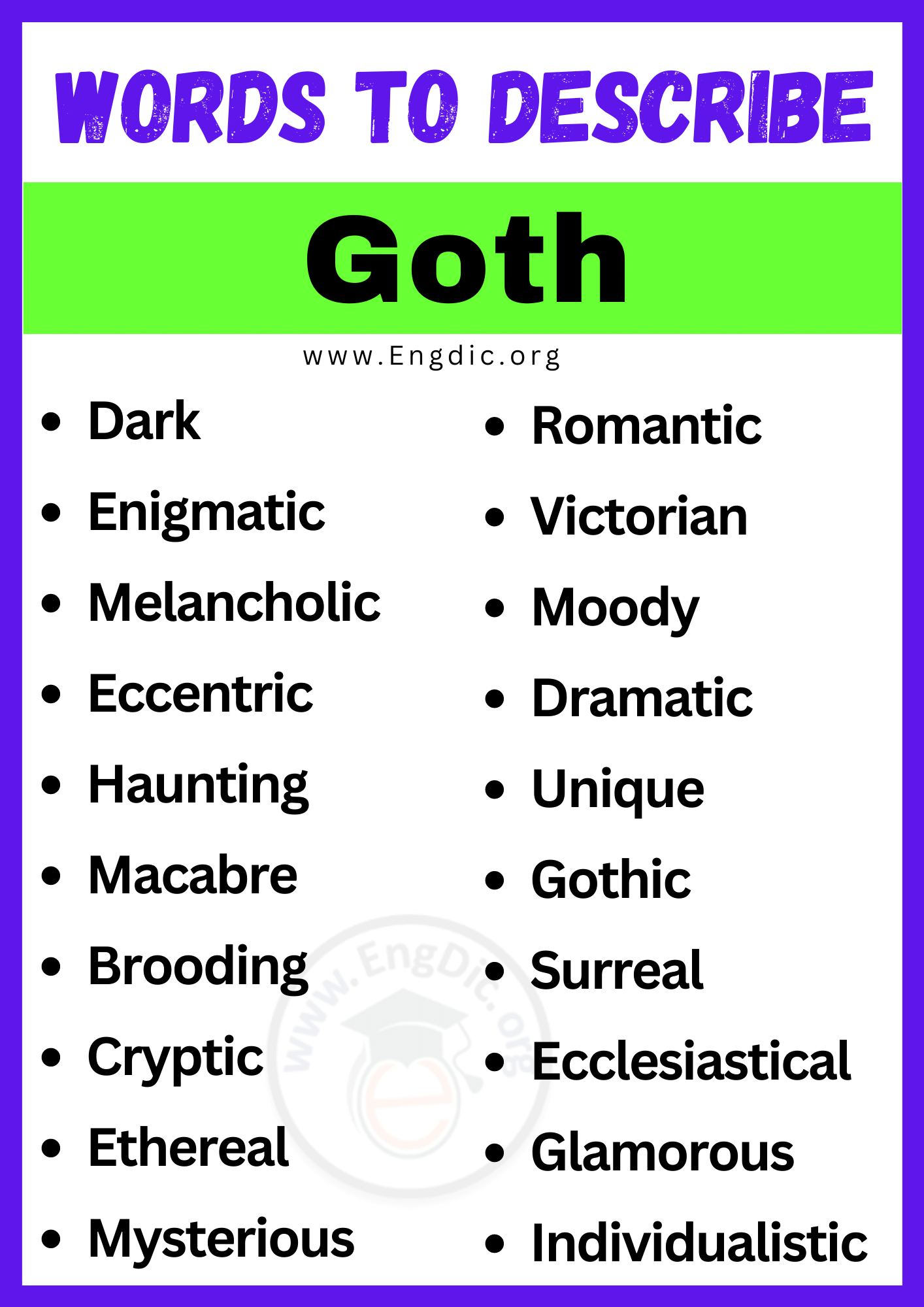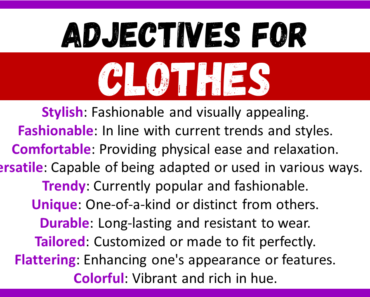Goth: a subculture that embraces darkness, mystery, and individuality. The goth community has captivated hearts with its unique fashion, music, and lifestyle. Words to describe goths encompass a spectrum of emotions, including elegant, enigmatic, and ethereal.
They find beauty in the shadows and draw inspiration from the Victorian era, embracing elements of macabre and romanticism. This blog post delves into the diverse lexicon that captures the essence of goth, offering an insight into this captivating and enduring subculture.
Adjectives for Goth
Here are the 20 Most Popular adjectives for goth:
- Dark
- Enigmatic
- Melancholic
- Eccentric
- Haunting
- Macabre
- Brooding
- Cryptic
- Ethereal
- Mysterious
- Romantic
- Victorian
- Moody
- Dramatic
- Unique
- Gothic
- Surreal
- Ecclesiastical
- Glamorous
- Individualistic
Adjectives for Gothic Writing:
- Dark
- Eerie
- Melancholic
- Haunting
- Mysterious
- Macabre
- Atmospheric
- Gloomy
- Enigmatic
- Foreboding
Adjectives for Gothic Literature:
- Brooding
- Gothic
- Supernatural
- Decadent
- Gothic Romance
- Uncanny
- Pensive
- Grim
- Sinister
- Alluring
Adjectives for Gothic Architecture:
- Ornate
- Majestic
- Spooky
- Medieval
- Dramatic
- Imposing
- Grandiose
- Awe-inspiring
- Shadowy
- Enchanting
Words to Describe Goth with Meanings
- Dark: Associated with shadows and gloom.
- Enigmatic: Mysterious and puzzling in nature.
- Melancholic: Characterized by a deep, somber sadness.
- Eccentric: Unconventional and peculiar in behavior.
- Haunting: Evoking strong, eerie emotions or memories.
- Macabre: Dealing with death and the gruesome.
- Brooding: Deeply thoughtful and introspective.
- Cryptic: Having hidden or mysterious meanings.
- Ethereal: Delicate and otherworldly in appearance.
- Mysterious: Full of intrigue and secretiveness.
- Romantic: Embracing emotions, beauty, and imagination.
- Victorian: Relating to the 19th-century era.
- Moody: Subject to frequent changes in mood.
- Dramatic: Intense, emotional, and theatrical.
- Unique: Exceptionally distinctive and original.
- Gothic: Relating to the goth subculture.
- Surreal: Dreamlike and beyond ordinary reality.
- Ecclesiastical: Relating to the church or clergy.
- Glamorous: Attractive and sophisticated in style.
- Individualistic: Emphasizing uniqueness and independence.
Example Sentences for Goth Adjectives
- The dark forest was filled with secrets.
- Her enigmatic smile left me intrigued.
- The painting evoked a melancholic mood.
- He dressed in an eccentric and bold style.
- The old mansion had a haunting aura.
- The story had a macabre twist.
- He was in a brooding mood all day.
- The message was written in cryptic code.
- The ballerina danced with an ethereal grace.
- The treasure map was a mysterious puzzle.
- The couple had a romantic dinner together.
- She loved collecting Victorian antiques.
- Her mood was moody and unpredictable.
- The play’s climax was dramatic and intense.
- His artwork displayed a unique style.
- She expressed herself through gothic fashion.
- The dream felt surreal and bizarre.
- The cathedral had stunning ecclesiastical architecture.
- The actress glowed in a glamorous gown.
- He was known for his individualistic approach.
Explore More Words:
FAQ’s
How to describe goth writing?
Goth writing is dark, mysterious, and often delves into themes of the macabre and the supernatural.
What makes a person goth?
Being goth is characterized by embracing gothic subculture elements, such as unique fashion, music preferences, and an appreciation for the dark and alternative aesthetics.
What do Goths believe?
Goths have diverse beliefs, but many value individualism, artistic expression, and find beauty in the shadows, embracing a fascination with the mysterious and the melancholic.








